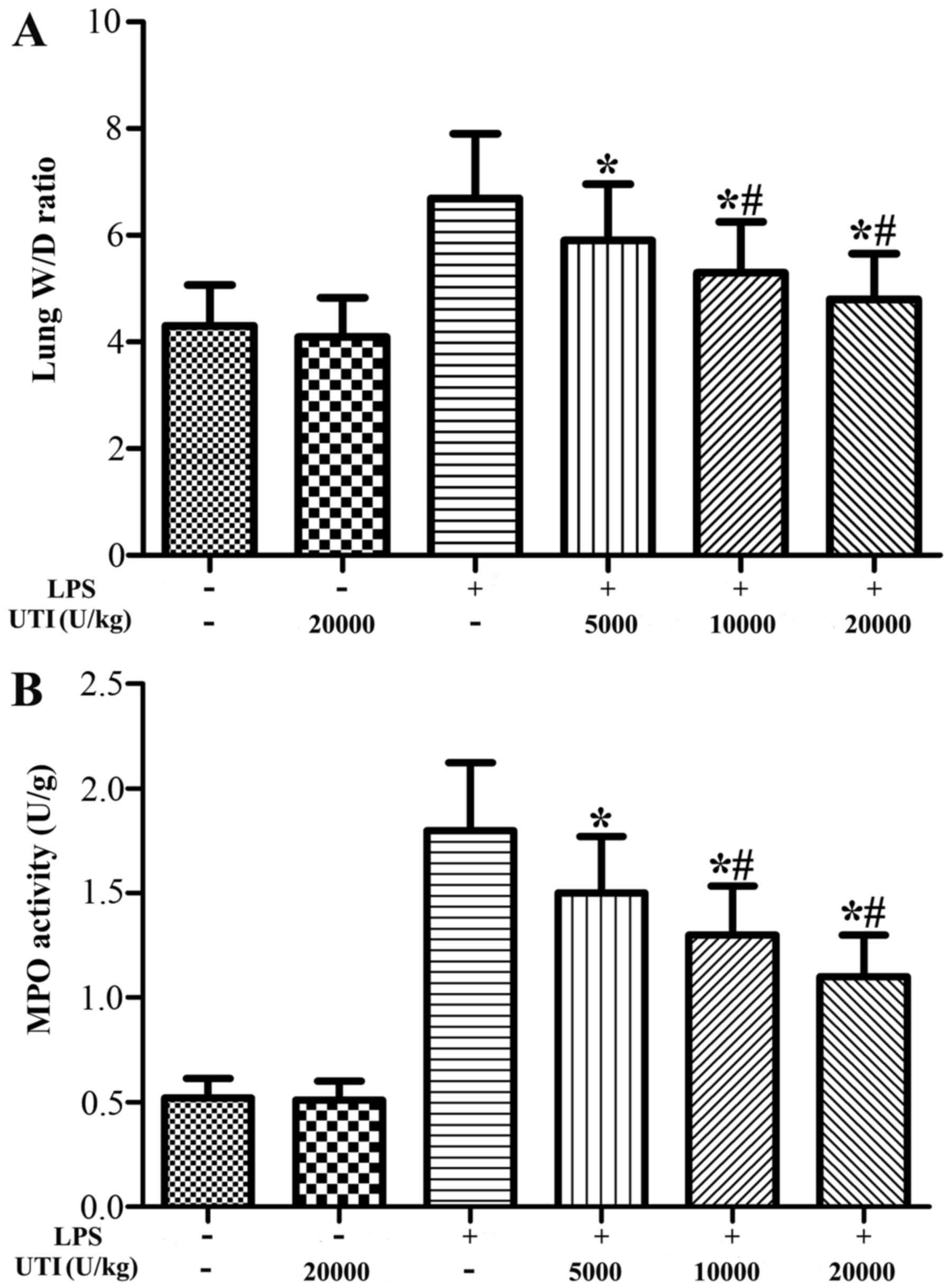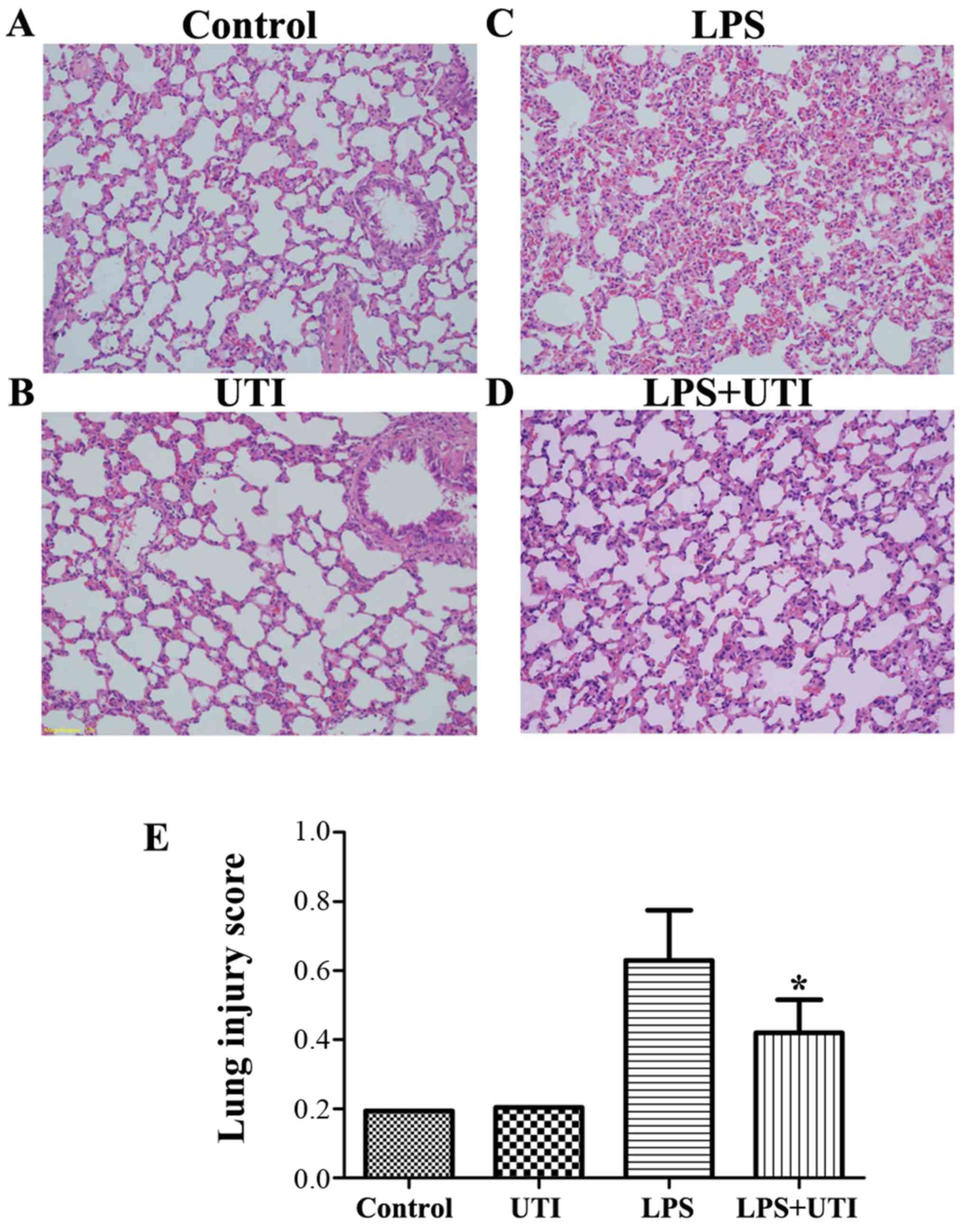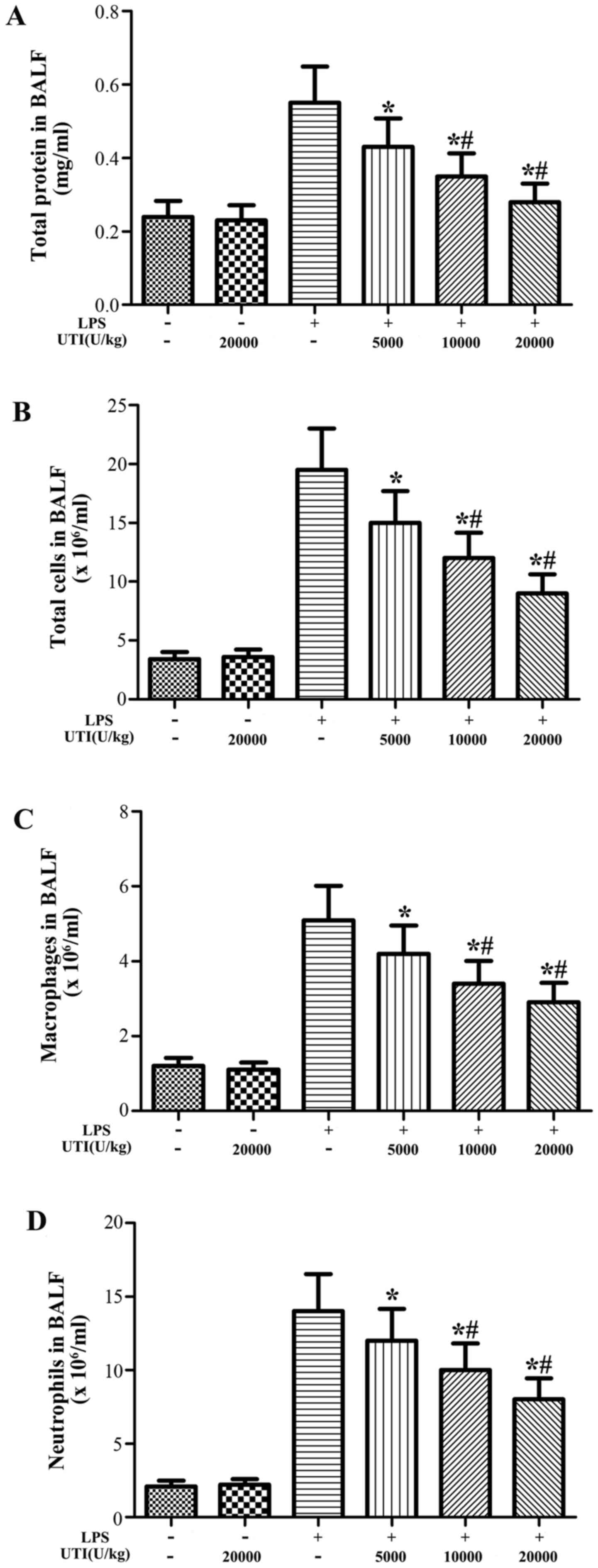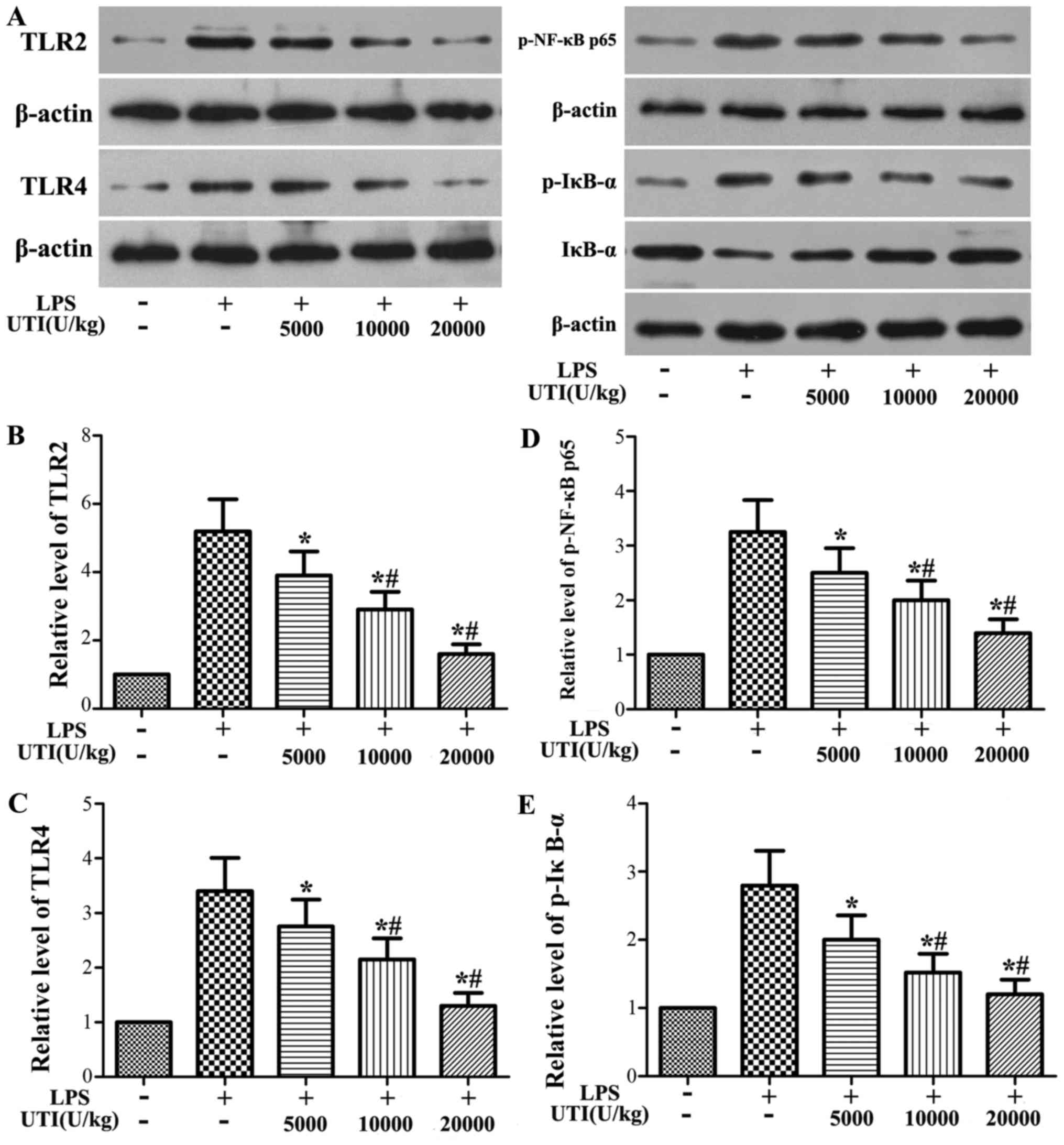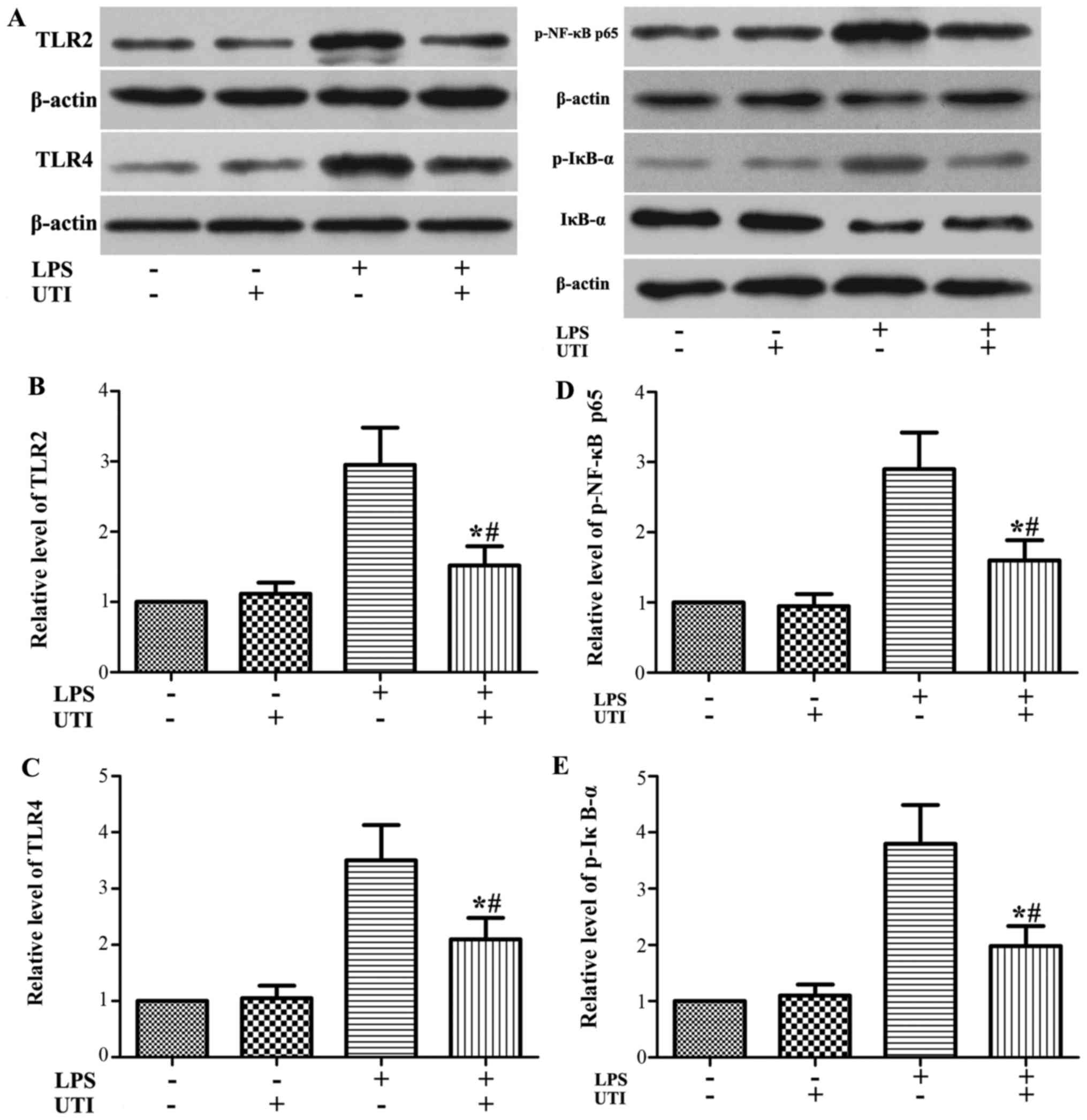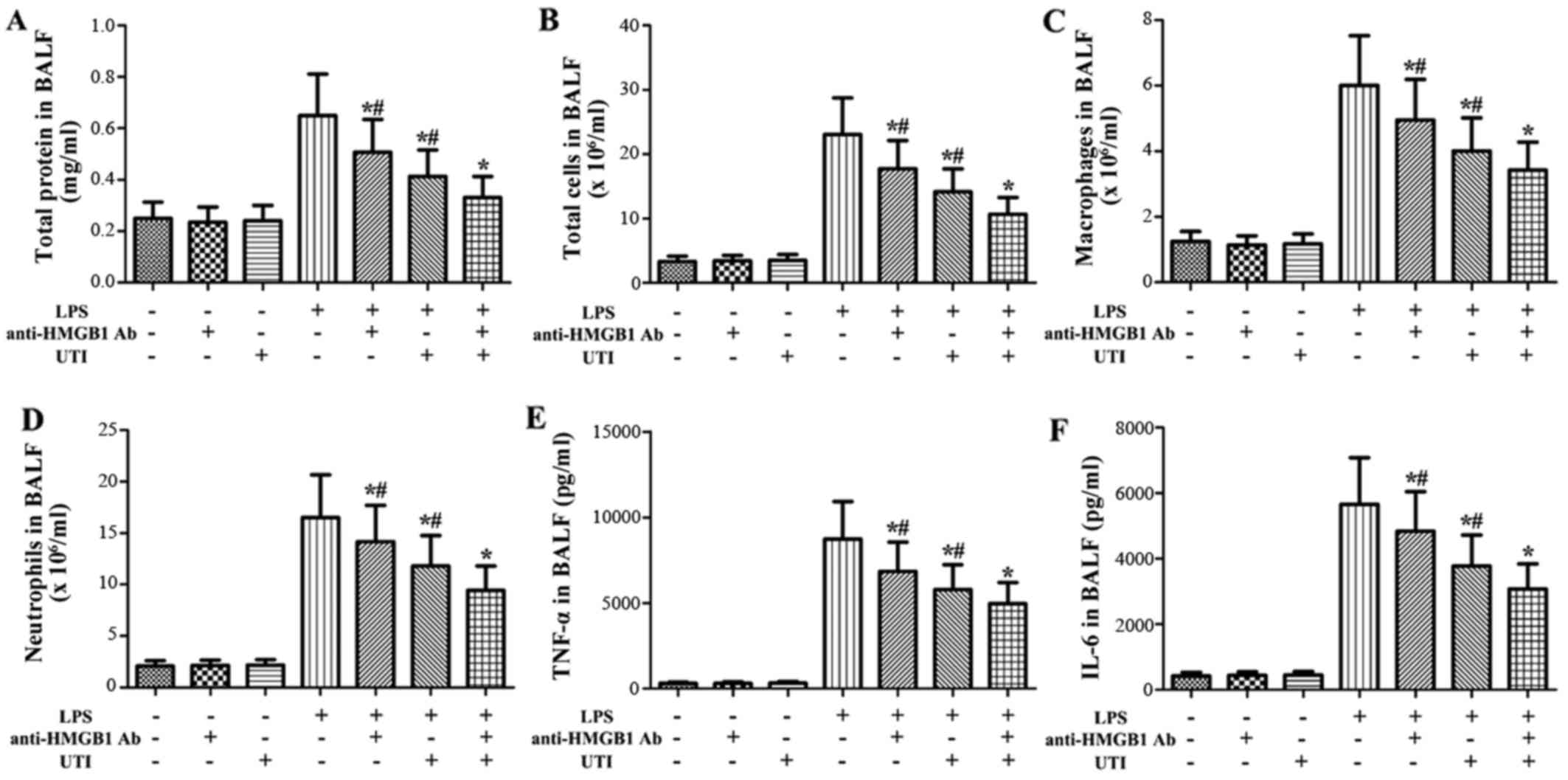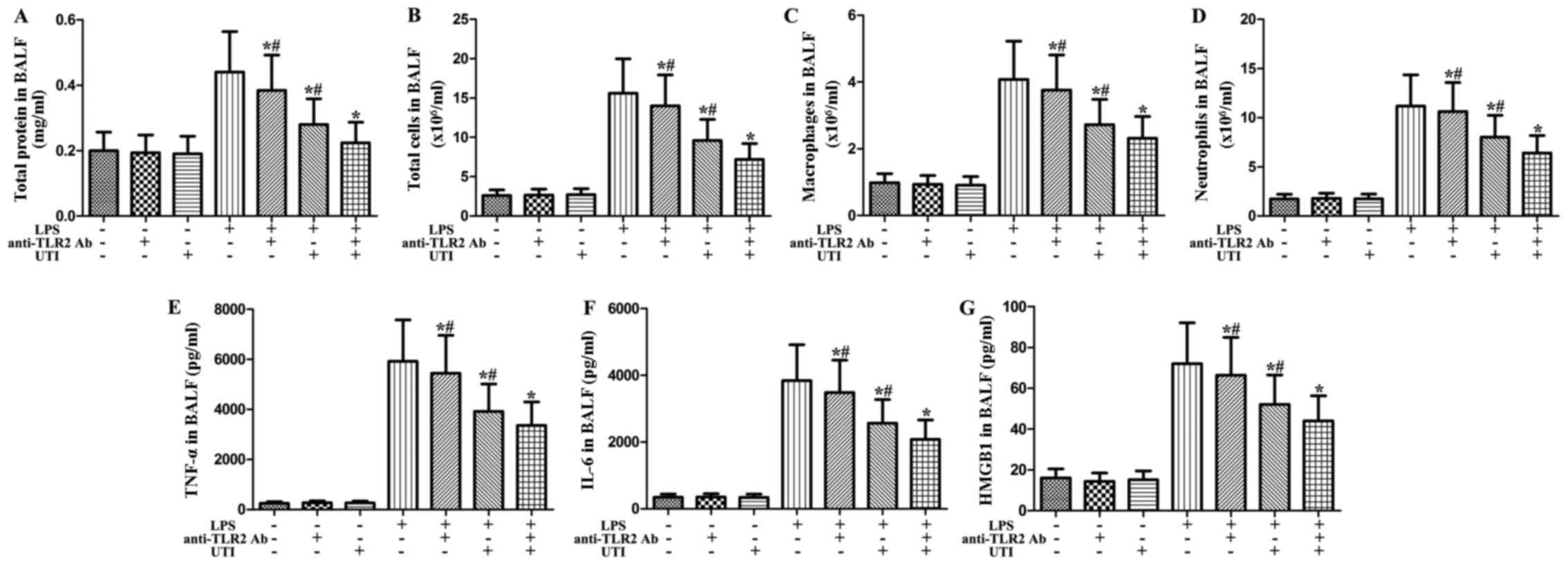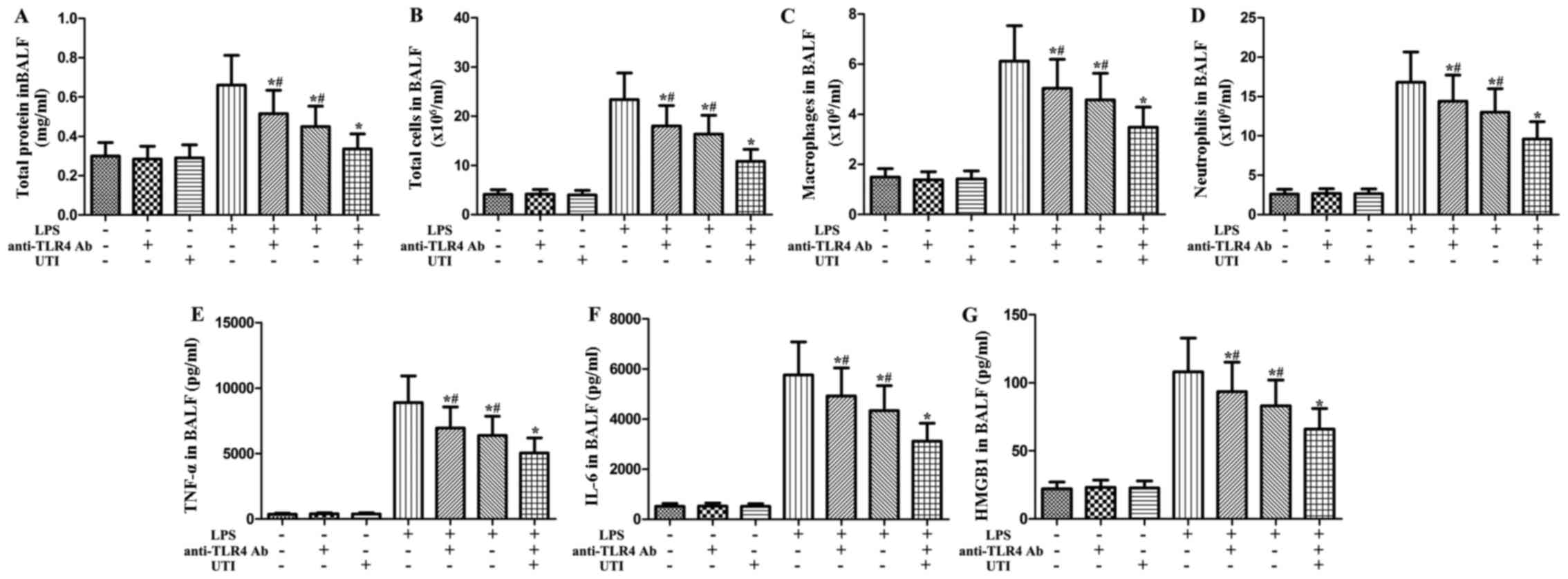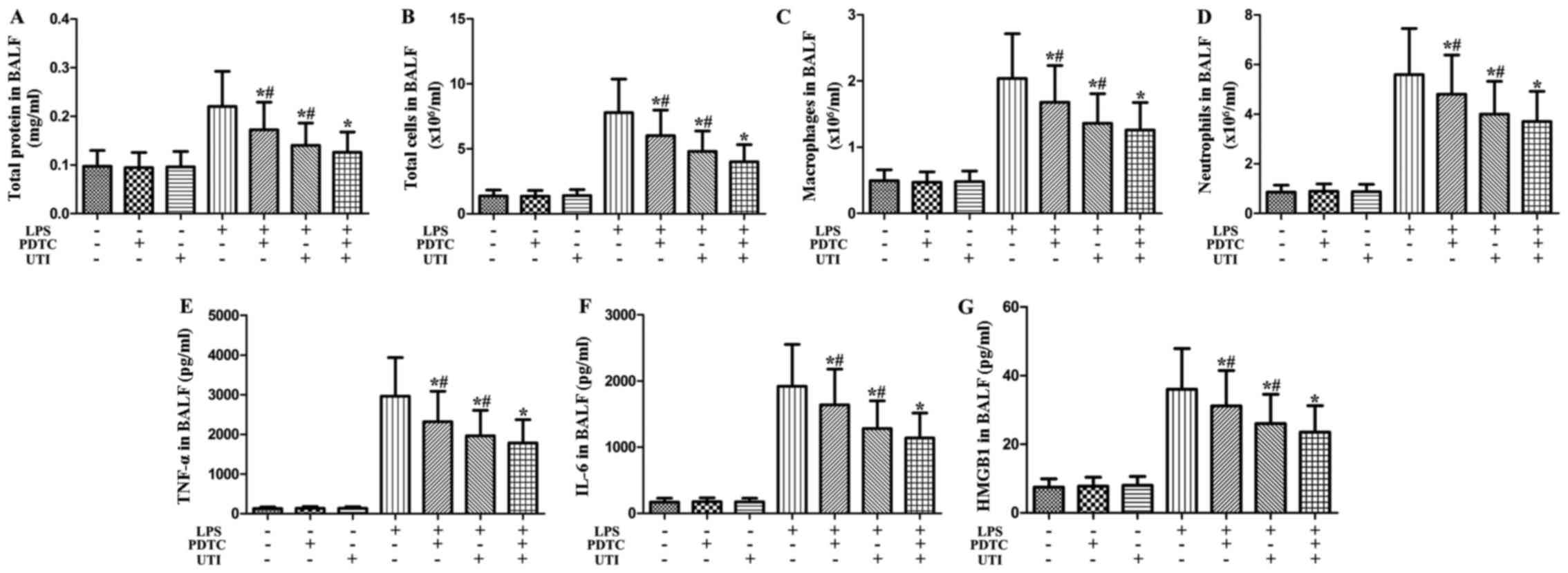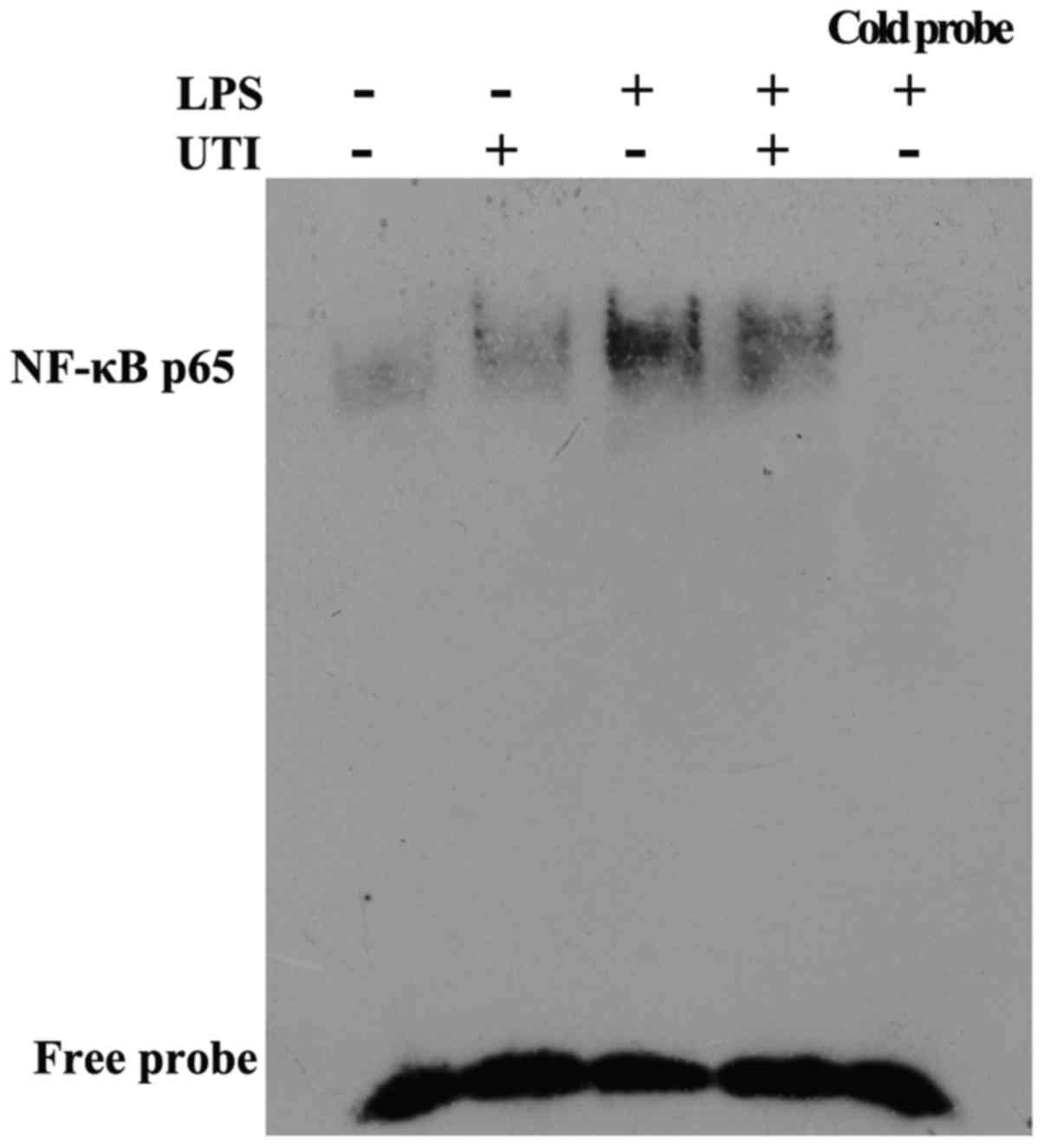|
1
|
Su CF, Kao SJ and Chen HI: Acute
respiratory distress syndrome and lung injury: Pathogenetic
mechanism and therapeutic implication. World J Crit Care Med.
1:50–60. 2012. View Article : Google Scholar : PubMed/NCBI
|
|
2
|
Castellheim A, Brekke OL, Espevik T,
Harboe M and Mollnes TE: Innate immune responses to danger signals
in systemic inflammatory response syndrome and sepsis. Scand J
Immunol. 69:479–491. 2009. View Article : Google Scholar : PubMed/NCBI
|
|
3
|
Jing H, Yao J, Liu X, Fan H, Zhang F, Li
Z, Tian X and Zhou Y: Fish-oil emulsion (omega-3 polyunsaturated
fatty acids) attenuates acute lung injury induced by intestinal
ischemia-reperfusion through Adenosine 5′-monophosphate-activated
protein kinase-sirtuin1 pathway. J Surg Res. 187:252–261. 2014.
View Article : Google Scholar
|
|
4
|
Song Z, Zhao X, Gao Y, Liu M, Hou M, Jin H
and Cui Y: Recombinant human brain natriuretic peptide ameliorates
trauma-induced acute lung injury via inhibiting JAK/STAT signaling
pathway in rats. J Trauma Acute Care Surg. 78:980–987. 2015.
View Article : Google Scholar : PubMed/NCBI
|
|
5
|
Lin WC, Chen CW, Huang YW, Chao L, Chao J,
Lin YS and Lin CF: Kallistatin protects against sepsis-related
acute lung injury via inhibiting inflammation and apoptosis. Sci
Rep. 5:124632015. View Article : Google Scholar : PubMed/NCBI
|
|
6
|
Lu B, Wang C, Wang M, Li W, Chen F, Tracey
KJ and Wang H: Molecular mechanism and therapeutic modulation of
high mobility group box 1 release and action: An updated review.
Expert Rev Clin Immunol. 10:713–727. 2014. View Article : Google Scholar : PubMed/NCBI
|
|
7
|
Agalave NM and Svensson CI: Extracellular
high-mobility group box 1 protein (HMGB1) as a mediator of
persistent pain. Mol Med. 20:569–578. 2015.
|
|
8
|
Wang H, Ward MF and Sama AE: Targeting
HMGB1 in the treatment of sepsis. Expert Opin Ther Targets.
18:257–268. 2014. View Article : Google Scholar : PubMed/NCBI
|
|
9
|
Wang H, Bloom O, Zhang M, Vishnubhakat JM,
Ombrellino M, Che J, Frazier A, Yang H, Ivanova S, Borovikova L, et
al: HMG-1 as a late mediator of endotoxin lethality in mice.
Science. 285:248–251. 1999. View Article : Google Scholar : PubMed/NCBI
|
|
10
|
Lutz W and Stetkiewicz J: High mobility
group box 1 protein as a late-acting mediator of acute lung
inflammation. Int J Occup Med Environ Health. 17:245–254.
2004.PubMed/NCBI
|
|
11
|
Yang H, Ochani M, Li J, Qiang X, Tanovic
M, Harris HE, Susarla SM, Ulloa L, Wang H, DiRaimo R, et al:
Reversing established sepsis with antagonists of endogenous
high-mobility group box 1. Proc Natl Acad Sci USA. 101:296–301.
2004. View Article : Google Scholar :
|
|
12
|
Ye C, Choi JG, Abraham S, Wu H, Diaz D,
Terreros D, Shankar P and Manjunath N: Human macrophage and
dendritic cell-specific silencing of high-mobility group protein B1
ameliorates sepsis in a humanized mouse model. Proc Natl Acad Sci
USA. 109:21052–21057. 2012. View Article : Google Scholar : PubMed/NCBI
|
|
13
|
van Beijnum JR, Buurman WA and Griffioen
AW: Convergence and amplification of toll-like receptor (TLR) and
receptor for advanced glycation end products (RAGE) signaling
pathways via high mobility group B1 (HMGB1). Angiogenesis.
11:91–99. 2008. View Article : Google Scholar : PubMed/NCBI
|
|
14
|
Park JS, Gamboni-Robertson F, He Q,
Svetkauskaite D, Kim JY, Strassheim D, Sohn JW, Yamada S, Maruyama
I, Banerjee A, et al: High mobility group box 1 protein interacts
with multiple Toll-like receptors. Am J Physiol Cell Physiol.
290:C917–C924. 2006. View Article : Google Scholar
|
|
15
|
Kim S, Kim SY, Pribis JP, Lotze M, Mollen
KP, Shapiro R, Loughran P, Scott MJ and Billiar TR: Signaling of
high mobility group box 1 (HMGB1) through toll-like receptor 4 in
macrophages requires CD14. Mol Med. 19:88–98. 2013. View Article : Google Scholar : PubMed/NCBI
|
|
16
|
Hirata Y, Kurobe H, Higashida M, Fukuda D,
Shimabukuro M, Tanaka K, Higashikuni Y, Kitagawa T and Sata M:
HMGB1 plays a critical role in vascular inflammation and lesion
formation via toll-like receptor 9. Atherosclerosis. 231:227–233.
2013. View Article : Google Scholar : PubMed/NCBI
|
|
17
|
Cao YZ, Tu YY, Chen X, Wang BL, Zhong YX
and Liu MH: Protective effect of Ulinastatin against murine models
of sepsis: Inhibition of TNF-α and IL-6 and augmentation of IL-10
and IL-13. Exp Toxicol Pathol. 64:543–547. 2012. View Article : Google Scholar
|
|
18
|
Wang N, Liu X, Zheng X, Cao H, Wei G, Zhu
Y, Fan S, Zhou H and Zheng J: Ulinastatin is a novel candidate drug
for sepsis and secondary acute lung injury, evidence from an
optimized CLP rat model. Int Immunopharmacol. 17:799–807. 2013.
View Article : Google Scholar : PubMed/NCBI
|
|
19
|
Gao C, Li R and Wang S: Ulinastatin
protects pulmonary tissues from lipopolysaccharide-induced injury
as an immunomodulator. J Trauma Acute Care Surg. 72:169–176.
2012.
|
|
20
|
Li W, Qiu X, Jiang H, Zhi Y, Fu J and Liu
J: Ulinastatin inhibits the inflammation of LPS-induced acute lung
injury in mice via regulation of AMPK/NF-κB pathway. Int
Immunopharmacol. 29:560–567. 2015. View Article : Google Scholar : PubMed/NCBI
|
|
21
|
Huang N, Wang F, Wang Y, Hou J, Li J and
Deng X: Ulinastatin improves survival of septic mice by suppressing
inflammatory response and lymphocyte apoptosis. J Surg Res.
182:296–302. 2013. View Article : Google Scholar
|
|
22
|
Shen W, Gan J, Xu S, Jiang G and Wu H:
Penehyclidine hydrochloride attenuates LPS-induced acute lung
injury involvement of NF-kappaB pathway. Pharmacol Res. 60:296–302.
2009. View Article : Google Scholar : PubMed/NCBI
|
|
23
|
Wang F, Meng Y, Zhang Y, Zhao G, Zheng X,
Xiao Q and Yu Y: Ketamine reduces lipopolysaccharide-induced
high-mobility group box-1 through heme oxygenase-1 and nuclear
factor erythroid 2-related factor 2/p38 mitogen-activated protein
kinase. J Surg Res. 194:599–613. 2015. View Article : Google Scholar : PubMed/NCBI
|
|
24
|
Sung YH, Shin MS, Ko IG, Kim SE, Kim CJ,
Ahn HJ, Yoon HS and Lee BJ: Ulinastatin suppresses
lipopolysaccharide-induced prostaglandin E2 synthesis and nitric
oxide production through the downregulation of nuclear factor-κB in
BV2 mouse microglial cells. Int J Mol Med. 31:1030–1036.
2013.PubMed/NCBI
|
|
25
|
Feng G, Sun B and Li TZ: Daidzein
attenuates lipopolysaccharide-induced acute lung injury via
toll-like receptor 4/NF-kappaB pathway. Int Immunopharmacol.
26:392–400. 2015. View Article : Google Scholar : PubMed/NCBI
|
|
26
|
Tianzhu Z and Shumin W: Esculin inhibits
the inflammation of LPS-induced acute lung injury in mice via
regulation of TLR/NF-κB pathways. Inflammation. 38:1529–1536. 2015.
View Article : Google Scholar : PubMed/NCBI
|
|
27
|
Kawasaki T and Kawai T: Toll-like receptor
signaling pathways. Front Immunol. 5:4612014. View Article : Google Scholar : PubMed/NCBI
|
|
28
|
Chang Y, Huang X, Liu Z, Han G, Huang L,
Xiong YC and Wang Z: Dexmedetomidine inhibits the secretion of high
mobility group box 1 from lipopolysaccharide-activated macrophages
in vitro. J Surg Res. 181:308–314. 2013. View Article : Google Scholar
|
|
29
|
Liu Z, Zhang J, Huang X, Huang L, Li S and
Wang Z: Magnesium sulfate inhibits the secretion of high mobility
group box 1 from lipopolysaccharide-activated RAW264.7 macrophages
in vitro. J Surg Res. 179:e189–e195. 2013. View Article : Google Scholar
|
|
30
|
Liu Z, Chang Y, Zhang J, Huang X, Jiang J,
Li S and Wang Z: Magnesium deficiency promotes secretion of
high-mobility group box 1 protein from lipopolysaccharide-activated
macrophages in vitro. J Surg Res. 180:310–316. 2013. View Article : Google Scholar
|
|
31
|
Yang Q, Liu X, Yao Z, Mao S, Wei Q and
Chang Y: Penehyclidine hydrochloride inhibits the release of
high-mobility group box 1 in lipopolysaccharide-activated RAW264.7
cells and cecal ligation and puncture-induced septic mice. J Surg
Res. 186:310–317. 2014. View Article : Google Scholar
|
|
32
|
Yamauchi Y, Izumi Y, Inoue M, Sugiura H,
Goto T, Anraku M, Ohtsuka T, Kohno M, Soejima K and Nomori H:
Safety of postoperative administration of human urinary trypsin
inhibitor in lung cancer patients with idiopathic pulmonary
fibrosis. PLoS One. 6:e290532011. View Article : Google Scholar
|
|
33
|
Inoue K and Takano H: Urinary trypsin
inhibitor as a therapeutic option for endotoxin-related
inflammatory disorders. Expert Opin Investig Drugs. 19:513–520.
2010. View Article : Google Scholar : PubMed/NCBI
|
|
34
|
Maciejewski R, Burdan F, Burski K, Madej
B, Ziemiakowicz R, Dabrowski A and Wallner G: Selected biochemical
parameters and ultrastructural picture of pancreas due to
Ulinastatin treatment of experimental acute pancreatitis. Exp
Toxicol Pathol. 56:305–311. 2005. View Article : Google Scholar : PubMed/NCBI
|















